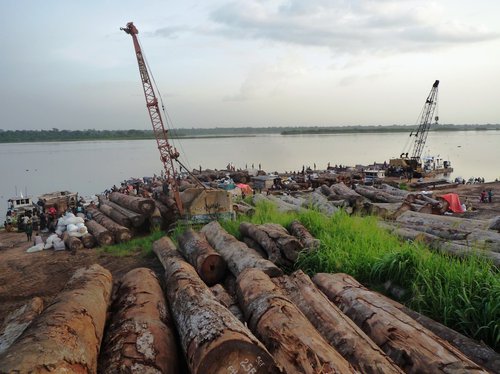Today, Boris Johnson takes office as the new Prime Minister of the United Kingdom. Whilst Brexit will no doubt continue to dominate political discourse for the foreseeable future this is also a critical moment for many of the issues we at Global Witness are championing, not least saving our world from climate disaster. As the doors to number 10 swing open to a new occupant we lay down three important challenges that may determine the future of the country and its impact on the wider world:
1. Stop subsidising fossil fuels
Amidst the chaos of the twilight of Theresa May’s premiership, a largely symbolic but politically significant step forward was taken on climate change. The target of zero-net greenhouse emissions by 2050 was short of what the science dictates, but more ambitious than expected. So now the new government needs to develop the policy that maps out a credible path to that 2050 target. One dirty secret the Government is rarely keen to talk about is the issue of UK public subsidy of fossil fuels, both at home and abroad.
 Earlier
this year, the European Commission identified the UK as the largest provider of fossil fuel subsidies in
the EU, providing 12 billion euros of subsidy. This is public cash that
should be used to help manage a transition away from fossil fuel extraction , particularly in UK regions dependent on oil and gas, rather than providing tax
breaks for oil and gas corporations to carry on prospecting for yet more oil
and gas. Our colleagues at Oil Change International have demonstrated how this can be done in a
way that protects workers and communities as well as the climate.
Earlier
this year, the European Commission identified the UK as the largest provider of fossil fuel subsidies in
the EU, providing 12 billion euros of subsidy. This is public cash that
should be used to help manage a transition away from fossil fuel extraction , particularly in UK regions dependent on oil and gas, rather than providing tax
breaks for oil and gas corporations to carry on prospecting for yet more oil
and gas. Our colleagues at Oil Change International have demonstrated how this can be done in a
way that protects workers and communities as well as the climate.
The UK also subsidises pollution abroad. Research conducted by the Overseas Development Institute (ODI), CAFOD and others shows that over the last seven years, 97% of all support provided by UK Export Finance (the UK’s export credit agency which underwrites loans and insurance for export deals) went to fossil fuels. An analysis by Carbon Brief shows that the £4.8 billion total UKEF support for fossil fuel projects from 2010-16 is almost equal to the UK’s total spend on its International Climate Fund for a similar period, 2011-17, which came to £4.9 billion. This means the UK is undermining its own international climate change mitigation efforts and its credibility by supporting fossil fuel projects.
The ongoing subsidy of fossil fuels severely undermine the UK’s efforts to claim an international leadership role on the issue of climate change. This year, we gave evidence to a committee of MPs who agreed with us, and called for an end to taxpayer support for overseas fossil fuels ventures by 2021. If the UK is successful in its application to host the UN climate change talks in 2020 (COP26), then this hypocrisy will come under intense scrutiny. For the good of the climate and our international standing on the world stage, it is time to bring the UK’s subsidy regime in line with the climate science by bringing fossil fuel subsidy to an end. Is Mr. Johnson up to the challenge?
2. Don’t turn the UK into a bargain basement economy – shut the door to dirty money for once and for all
Whilst progress in stemming the enormous tide of dirty money flowing into, and through, the UK has been made in the past few years there is still some way to go. The noises have been good but as yet it’s been more words than action. Under the surface murmurings of whether Brexit will require new and less regulated investment have been audible, stoking fears that efforts to combat dirty money will be stalled.
It is absolutely vital that any retreat is resisted. To roll the red carpet back out for the world’s corrupt and criminal would be to reinforce the suffering felt by victims of corruption – the perpetrators of which have so often turned to the UK to hide and move the proceeds of their illicit activity. A key test of whether the new Prime Minister will promote the rule of law or stand for investment at any cost will be how he prioritises bringing transparency to the UK property market.
 It’s
been more than three years since we were first promised a public register that
would name the individuals who are the owners of overseas companies that buy UK
property – removing the veil of anonymity so often used by the corrupt to
launder money into UK property. Last week we took a step closer, when the government responded to a Parliamentary committe, but legislation has
yet to be tabled to make this a reality. With the hard work done, our challenge
to Mr. Johnson is to ensure legislation for this measure is tabled immediately
and allowed to safely pass into law.
It’s
been more than three years since we were first promised a public register that
would name the individuals who are the owners of overseas companies that buy UK
property – removing the veil of anonymity so often used by the corrupt to
launder money into UK property. Last week we took a step closer, when the government responded to a Parliamentary committe, but legislation has
yet to be tabled to make this a reality. With the hard work done, our challenge
to Mr. Johnson is to ensure legislation for this measure is tabled immediately
and allowed to safely pass into law.
It’s also fundamental that progress is made on the role of the UK’s Overseas Territories and Crown Dependencies; cleaning up at home doesn’t simply mean outsourcing the facilitation of corruption outside of mainland Britain. Last year Parliament required all of the British Overseas Territories to bring in their own public registers of beneficial ownership, while just recently the British Crown Dependencies announced they would voluntarily take similar action. Since that vote leadership in the Overseas Territories have spent more time arguing against the need for transparency than working to make it happen, whilst the government has done little (publicly at least) to suggest it is supporting these efforts. The new government must not allow the Overseas Territories to wriggle out of their obligation to ensure company ownership transparency, nor the Crown Dependencies to shirk from their promise to implement the EU's Fifth Anti-Money Laundering that requires beneficial ownership transparency.
3. Use the UK’s Environment Bill as a chance to halt global deforestation
With the UK’s climate preparations currently leaving much to be desired, the Environment Bill the new PM inherits contains an historic opportunity to substantially raise environmental standards, especially when it comes to deforestation, not just for the UK but across the globe.
If the PM is serious about tackling climate change, he must get serious about deforestation. He should use the Bill as an opportunity to tackle the emissions associated with the UK’s consumption and imports and the mass deforestation both of these drive. In order to satiate UK consumers’ appetites for imported commodities like beef, palm oil and timber, a land mass more than half the size of the UK itself is needed to grow them. And more than 40% of that land mass is located in countries with weak protections for human rights and the environment.
 These imports not only destroy
forests crucial for fighting climate breakdown but also carry grave human
rights risks. In 2017, agribusiness was the biggest driver for attacks against land
and environmental defenders across the globe. Mr. Johnson should use the
Environment Bill to help end these patterns: laying a path that requires
companies to conduct mandatory due diligence on their investments and supply
chains to eliminate deforestation and reduce emissions.
These imports not only destroy
forests crucial for fighting climate breakdown but also carry grave human
rights risks. In 2017, agribusiness was the biggest driver for attacks against land
and environmental defenders across the globe. Mr. Johnson should use the
Environment Bill to help end these patterns: laying a path that requires
companies to conduct mandatory due diligence on their investments and supply
chains to eliminate deforestation and reduce emissions.
While there's a lot of chat about the back bench opposition the new PM will have to deal with when it comes to Brexit, he will also have to address a growing disquiet from the Tory backbenchers on the environment. There are some in the Conservative ranks leading a growing movement against fracking, and others have echoed concerns on the UK's global footprint on deforestation across the globe. As we speed towards climate breakdown and public concern for our environment grows, the political and planetary benefits of creating a landmark Environment Bill could be enormous.
These three challenges represent just a selection of what’s needed for the UK to take forward an ambitious agenda that stands up for both people and planet. Global Witness continues to fight on all fronts to make the world a better place for everyone and we will be watching closely the movements of Mr. Johnson to see whether the UK will help or hinder this fight.


